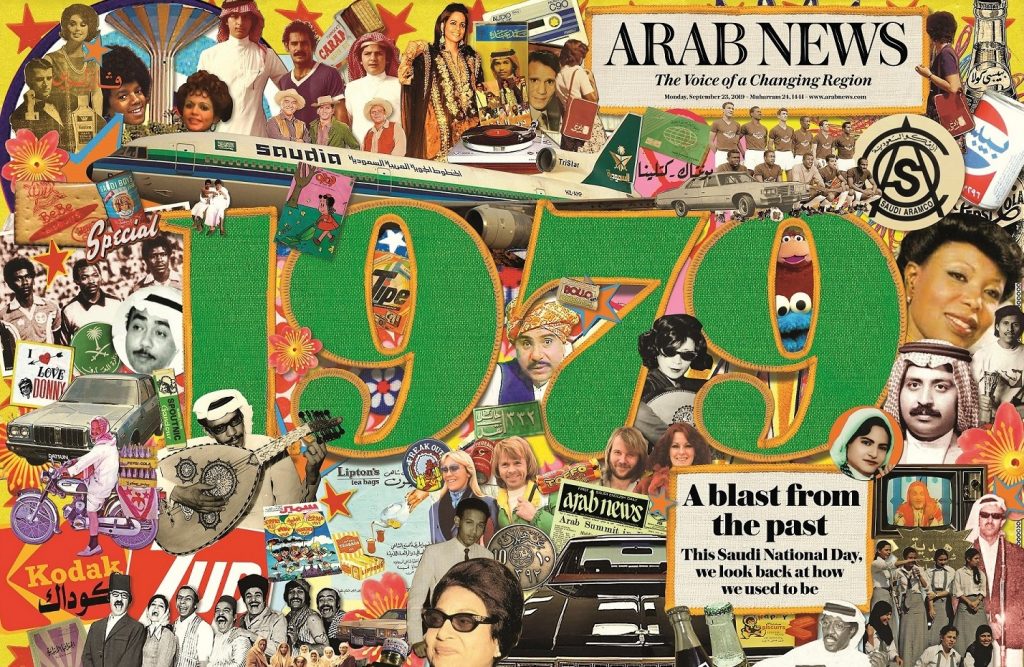
- ARAB NEWS
- 06 Jul 2025

This Saudi National Day, Arab News celebrates the future of Saudi Arabia by reviving its past. In particular, we go back to 1979 — a year in which cataclysmic events took place that changed the Kingdom, as well as the whole region.
Why 1979? Because as Crown Prince Mohammed bin Salman said during his interview with Norah O’Donnell on CBS last year: “We were living a very normal life like the rest of the Gulf countries. Women were driving cars. There were movie theaters in Saudi Arabia. Women worked everywhere. We were just normal people developing like any other country in the world until the events of 1979.”
The famous words of the crown prince were: “This is not the real Saudi Arabia. I would ask your viewers to use their smartphones to find out. And they can Google Saudi Arabia in the 1970s and 1960s, and they will see the real Saudi Arabia easily in the pictures.”
A year before the interview, in October 2017, the crown prince addressed the Future Investment Initiative conference in Riyadh, and said: “We are returning to what we were before — a country of moderate Islam.”
So what happened in 1979? Two events in particular: The Iranian revolution that brought Khomeini to power, and led to the terrorist acts of Juhayman Al-Otaibi in Saudi Arabia.
“If music existed in the days of the Prophet, and if men and women sat and worked together, then what right have these extremists to forbid what God has allowed?”
Faisal J. Abbas
Narrow-minded parochial winds swept the region as soon as Khomeini stepped off the plane from Paris in Iran. That led in turn to the whipping up of negative passions and actions by an equally dangerous obscurantist, Juhayman. He, along with his deluded followers, violated the sanctity of the Holy Mosque in Makkah by holding it hostage and spilling blood in the most hallowed place in Islam, our religion’s holy of holies, its sanctum sanctorum.
The events of 1979 cast a long shadow on what had been a peaceful Saudi society. They unleashed forces of darkness that plunged the whole region into unrest and uncertainty. It will be worth reading the article in our special National Day edition by our Iran affairs expert and head of the International Institute for Iranian Studies (Rasanah), Dr. Mohammed Al-Sulami. He explains in scholarly detail how the Iranian revolution had a negative impact on the entire Gulf. As he points out: “Iran’s relations with its Arab neighbors ... in the 1960s and 1970s ... were not as amicable as some suggest, (but) they were certainly not as bleak as they have been since 1979.”
We highlight the importance of Makkah and the savage acts of Juhayman and his men with accounts of eyewitnesses. We will also revisit this event on Nov. 20 this year — the 40th anniversary of the siege — and we promise our readers there will be a special Arab News documentary on every single aspect of those events.
Of course, the effects of 1979 manifested themselves in a wide variety of ways. They led to the previously unchecked power of the infamous religious police. As one of our articles points out, members of the group went about causing chaos in the name of religion. They banned cinemas, destroyed musical instruments, and raided hotels and restaurants, asking couples who were enjoying a meal together in public, or just having a coffee, for proof that they were indeed married. These so-called “promoters of virtue” intruded into the private lives of ordinary citizens, even engaging in car chases that resulted in accidents and loss of life.
This monopoly and high-handedness of the religious police was checked by the announcement of Crown Prince Mohammed bin Salman’s Vision 2030 program. The removal of the religious police from Saudi streets was, and is, one of the less hyped but most significant reforms of the current leadership. As we detail in one of the articles, the curbing of the religious police’s powers had a domino effect that allowed women to drive, work, travel freely, go to movies, enjoy music — and contribute positively and overall to the growth and progress of our country.
The reforms were criticized by some extremists who said what was happening in Saudi Arabia was a departure from religion — which is utter nonsense. If music existed in the days of the Prophet, and if men and women sat and worked together, then what right have these extremists to forbid what God has allowed? As one of the articles explains, until the end of 1979, Saudi TV used to broadcast songs and concerts by Saudi folk bands and artists, including female singers such as Toha, Etab and Ibtisam Lutfi, to say nothing of concert performances by Um Kalthoum, Fayza Ahmad, Samira Tawfik, Najat Al-Saghira and Farid Al-Atrach.
All this, and many more interesting and highly researched articles in this special edition, highlight how Saudi Arabia is reconnecting with its moderate past and moving into a future that has links to the past. While the missiles and drones from the land of Khomeini and the ayatollahs continue to spread darkness, Saudi Arabia is spreading light for a bright future for its people.
We hope you will enjoy our labor of love as much we have in executing this special project. A very happy National Day to all.
Faisal J. Abbas is the editor-in-chief of Arab News